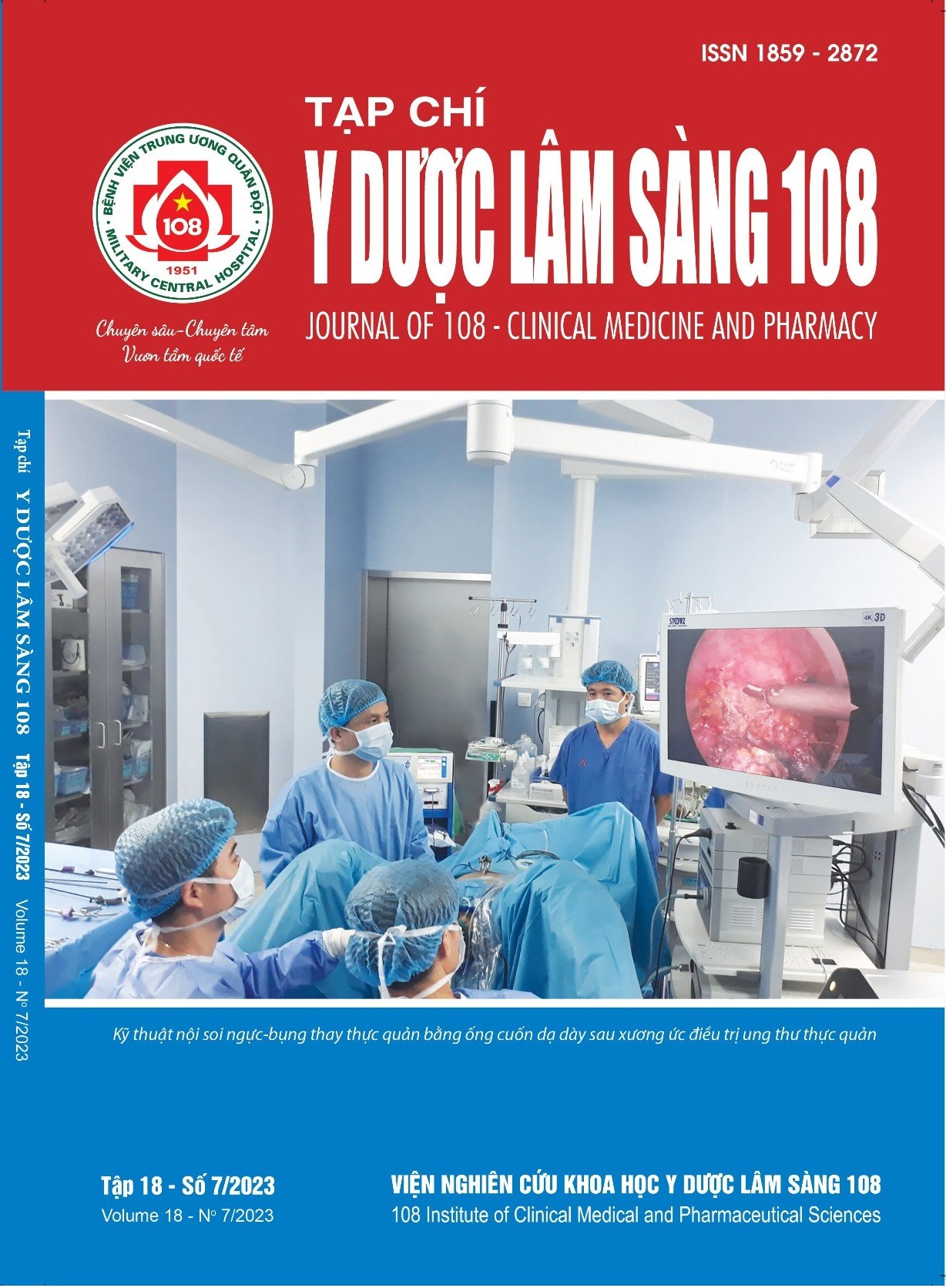Fusobacterium nucleatum là một trong những nguy cơ có thể gây ung thư đại trực tràng
Main Article Content
Keywords
Tóm tắt
Mục tiêu: Tìm hiểu mối liên quan giữa Fusobacterium nucleatum (F. nucleatum) với ung thư đại trực tràng (UTĐTT). Đối tượng và phương pháp: Nghiên cứu mô tả cắt ngang 192 bệnh nhân được chẩn đoán polyp hoặc UTĐTT các giai đoạn, điều trị tại Bệnh viện Trung ương Quân đội 108 từ tháng 5/2017 đến tháng 12/2020. Tỷ lệ nhiễm và tải lượng tương đối của F. nucleatum được xác định tại mô đại tràng theo các giai đoạn bệnh bằng xét nghiệm realtime PCR. Kết quả: Trong 192 bệnh nhân polyp hoặc UTĐTT, tỷ lệ nhiễm F. nucleatum tại mẫu mô đại tràng ở nhóm ung thư (76,3%) cao hơn 2 lần so với nhóm polyp (37,7%), mô ung thư (69,8%) cao hơn mô lành cạnh ung thư (46%) ở nhóm ung thư giai đoạn II (p<0,05). Tải lượng tương đối F. nucleatum ở nhóm ung thư giai đoạn III cao hơn giai đoạn I và giai đoạn II, và tải lượng tương đối F. nucleatum tại mô ung thư cao hơn mô lành ở nhóm ung thư giai đoạn II và III (p<0,05). Bệnh nhân ung thư đại trực tràng có nguy cơ nhiễm F. nucleatum cao gấp 3,2 lần (CI 95%: 1,2-8,8, p=0,02) so với nhóm polyp lành tính. Kết luận: Fusobacterium nucleatum có thể là một trong những tác nhân liên quan đến sự phát triển UTĐTT.
Article Details
Các tài liệu tham khảo
2. Collins D, Hogan AM, and Winter DC (2011) Microbial and viral pathogens in colorectal cancer. Lancet Oncol 12(5): 504-512.
3. Zur Hausen H (2009) The search for infectious causes of human cancers: Where and why. Virology 392(1): 1-10.
4. Sekirov I, Russell SL, Antunes LC, Finlay BB (2010) Gut microbiota in health and disease. Physiol Rev 90(3): 859-904.
5. Proctor LM (2011) The human microbiome project in 2011 and beyond. Cell Host Microbe 10(4): 287-291.
6. Elinav E, Nowarski R, Thaiss CA, Hu B, Jin C, Flavell RA (2013) Inflammation-induced cancer: crosstalk between tumours, immune cells and microorganisms. Nat Rev Cancer 13(11): 759-71.
7. Kostic AD, Chun E, Robertson L, Glickman JN, Gallini CA, Michaud M, Clancy TE, Chung DC, Lochhead P, Hold GL, El-Omar EM, Brenner D, Fuchs CS, Meyerson M, Garrett WS (2013) Fusobacterium nucleatum potentiates intestinal tumorigenesis and modulates the tumor-immune microenvironment. Cell Host Microbe 14(2): 207-215.
8. Yu T, Guo F, Yu Y, Sun T, Ma D, Han J, Qian Y, Kryczek I, Sun D, Nagarsheth N, Chen Y, Chen H, Hong J, Zou W, Fang JY (2017) Fusobacterium nucleatum promotes chemoresistance to colorectal cancer by modulating autophagy. Cell 170(3): 548-563.
9. Frederick M, Ausubel RB, Robert E Kingston, David D Moore, Seidman JG, John A Smith, and K.S. (eds.) (2003) Current Protocols in Molecular Biology. 66. John Wiley & Sons Inc.
10. Mima K, Sukawa Y, Nishihara R, Qian ZR, Yamauchi M, Inamura K, Kim SA, Masuda A, Nowak JA, Nosho K, Kostic AD, Giannakis M, Watanabe H, Bullman S, Milner DA, Harris CC, Giovannucci E, Garraway LA, Freeman GJ, Dranoff G, Chan AT, Garrett WS, Huttenhower C, Fuchs CS, Ogino S (2015) Fusobacterium nucleatum and T cells in colorectal carcinoma. JAMA Oncol 1(5): 653-661.
11. Sogin ML, Morrison HG, Huber JA, Mark Welch D, Huse SM, Neal PR, Arrieta JM, Herndl GJ (2006) Microbial diversity in the deep sea and the underexplored "rare biosphere". Proc Natl Acad Sci U S A 103(32): 12115-12120.
12. Bodenhausen N, Horton MW, and Bergelson J (2013) Bacterial communities associated with the leaves and the roots of Arabidopsis thaliana. PLoS One 8(2): 56329.
13. Wu YD, Chen LH, Wu XJ, Shang SQ, Lou JT, Du LZ, Zhao ZY (2008) Gram stain-specific-probe-based real-time PCR for diagnosis and discrimination of bacterial neonatal sepsis. J Clin Microbiol 46(8): 2613-2619.
14. Flanagan L, Schmid J, Ebert M, Soucek P, Kunicka T, Liska V, Bruha J, Neary P, Dezeeuw N, Tommasino M, Jenab M, Prehn JH, Hughes DJ (2014) Fusobacterium nucleatum associates with stages of colorectal neoplasia development, colorectal cancer and disease outcome. Eur J Clin Microbiol Infect Dis 33(8): 1381-1390.
15. Ito M, Kanno S, Nosho K, Sukawa Y, Mitsuhashi K, Kurihara H, Igarashi H, Takahashi T, Tachibana M, Takahashi H, Yoshii S, Takenouchi T, Hasegawa T, Okita K, Hirata K, Maruyama R, Suzuki H, Imai K, Yamamoto H, Shinomura Y (2015) Association of Fusobacterium nucleatum with clinical and molecular features in colorectal serrated pathway. Int J Cancer 137(6): 1258-1268.
16. Rubinstein MR, Wang X, Liu W, Hao Y, Cai G, Han YW (2013) Fusobacterium nucleatum promotes colorectal carcinogenesis by modulating E-cadherin/β-catenin signaling via its FadA adhesin. Cell Host Microbe 14(2): 195-206.
17. Abed J, Emgård JE, Zamir G, Faroja M, Almogy G, Grenov A, Sol A, Naor R, Pikarsky E, Atlan KA, Mellul A, Chaushu S, Manson AL, Earl AM, Ou N, Brennan CA, Garrett WS, Bachrach G (2016) Fap2 Mediates Fusobacterium nucleatum Colorectal Adenocarcinoma Enrichment by Binding to Tumor-Expressed Gal-GalNAc. Cell Host Microbe 20(2): 215-225.
 ISSN: 1859 - 2872
ISSN: 1859 - 2872
